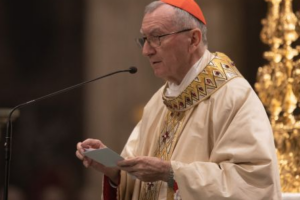CNA—UPDATED 01/17/23—The Permanent Council of the French Bishops’ Conference has expressed carefully delineated support for the Fiducia Supplicans declaration of the Dicastery for the Doctrine of the Faith on pastoral blessings.
In a Jan. 10 statement, the French Bishops Council acknowledged that the declaration addresses a sensitive topic, namely “the accompaniment in the Church for homosexual persons living as a couple” and “divorced persons engaged in a life as a couple.”
The Permanent Council said it received the declaration “as an encouragement to pastors to generously bless people who approach them humbly asking for God’s help.”
Pastors, the French prelates said, “thus accompany them on their journey of faith so that they discover the call of God in their own existence and respond concretely to it.”
The text of the French prelates points out that from Jesus Christ we receive the call “to an unconditional and merciful welcome, since Jesus ‘did not call to come the righteous, but sinners.’
The bishops said that Fiducia Supplicans states that “those not living in a situation allowing them to make a commitment in the sacrament of marriage are not excluded either from the love of God or from his Church.”
The Church, they said, at the same time, “encourages them in their desire to draw near God to benefit from the comfort of his presence and to implore the grace to conform their lives to the Gospel.”
The statement concluded by stating that “it is in particular through prayers of blessing, given in a spontaneous, ‘not ritualized’ form (No. 36), outside of any sign susceptible of being similar to the celebration of marriage, that the ministers of the Church will be able to demonstrate this broad and unconditional welcome.”
———-
ORIGINAL POST — Cardinal Pietro Parolin, the Vatican’s secretary of state, has commented on the divided reaction to the Fiducia Supplicans document amid a great backlash from episcopal conferences.
“This document has aroused very strong reactions; this means that a very delicate, very sensitive point has been touched; it will take further investigation,” Parolin said on Friday, Jan. 12, during a conference held at the Accademia dei Lincei in Rome.
The cardinal went on to say that “if these ferments serve to walk according to the Gospel to give answers to today, these ferments are also welcome,” while reiterating that “the Church is open and attentive to the signs of the times but must be faithful to the Gospel.”
When asked in a follow-up question by an Italian journalist if the document was a mistake, the Vatican’s top diplomat responded curtly: “I do not enter into these considerations; the reactions tell us that it has touched a very sensitive point.”
The Dicastery for the Doctrine of the Faith’s Dec. 18 document has made it permissible for priests to offer nonliturgical blessings for couples in “irregular” situations, including gay couples, noting “that it offers a specific and innovative contribution to the pastoral meaning of blessings, permitting a broadening and enrichment of the classical understanding of blessings.”
“What has been said in this declaration regarding the blessings of same-sex couples is sufficient to guide the prudent and fatherly discernment of ordained ministers in this regard. Thus, beyond the guidance provided above, no further responses should be expected about possible ways to regulate details or practicalities regarding blessings of this type,” Cardinal Víctor Manuel Fernández, head of the Dicastery for the Doctrine of the Faith, wrote in Fiducia Supplicans.
However, following widespread backlash from episcopal conferences in Africa and Eastern Europe, and strong denouncements from some of the Church’s senior prelates, Fernández issued a five-page press release on Jan. 4 to provide clarification on the document, writing that its application will depend “on local contexts and the discernment of each diocesan bishop with his diocese.”
“In some places, no difficulties arise for their immediate application, while in others it will be necessary not to introduce them, while taking the time necessary for reading and interpretation,” Fernández continued in the letter.
One of the strongest statements to date came from Cardinal Fridolin Ambongo Besungu, archbishop of Kinshasa and president of the Symposium of the Episcopal Conferences of Africa and Madagascar (SECAM).
In his Jan. 11 letter, Ambongo stressed that the African bishops “have strongly reaffirmed their communion with Pope Francis” but noted that Fiducia Supplicans caused “a shockwave” and has “sown misconceptions and unrest in the minds of many lay faithful, consecrated persons, and even pastors, and has aroused strong reactions.”
In his address to the clergy of Rome on Jan. 13, the pope provided clarifying remarks on the document, stating that “the provision on the blessings of gay couples concerns people, not organizations. If the LGBT association comes, no, but always people. We bless people, not sin.”




You must be logged in to post a comment.